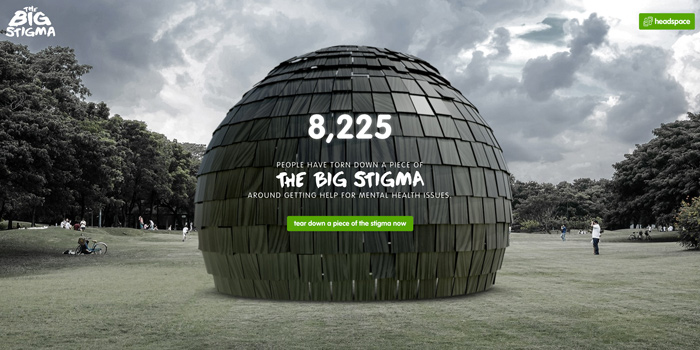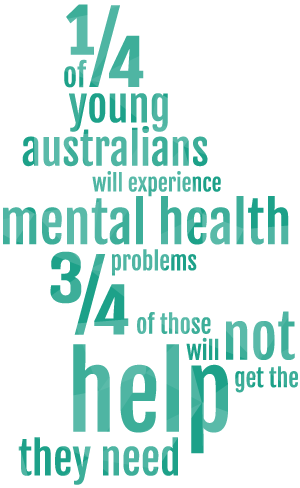The Big Stigma

As scary as it may seem, mental illness doesn’t have to be fought alone, but for a quarter of young Australians who experience mental health problems each year, 1 in every four will not seek the help they need or talk to anyone about what they’re experiencing. In light of these statistics Headspace, the National Youth Mental Health Foundation launched The Big Stigma awareness campaign. The campaign aims to tear down the stigma and negative perceptions around mental illness for young people, and encourage conversation. The data found that 52 percent of young Australians who suffer mental illness are too embarrassed to talk about their problems. With a quarter either not discussing their issues with anyone including close friends or the family doctor.
 The campaign began in Melbourne and was a physical representation of mental health stigma taking shape as a dome structure. Outside of Southern Cross Station, members of the public were invited to tear off a piece of the dome with information on the back of each panel explaining mental illness and where and how to get help. The result is that the stigma dome gets smaller and smaller the more people tear it down and learn about mental health.
The campaign began in Melbourne and was a physical representation of mental health stigma taking shape as a dome structure. Outside of Southern Cross Station, members of the public were invited to tear off a piece of the dome with information on the back of each panel explaining mental illness and where and how to get help. The result is that the stigma dome gets smaller and smaller the more people tear it down and learn about mental health.
The Big Stigma now exists as an online campaign thebigstigma, where people can tear down the stigma virtually and share it on Facebook and Twitter, encouraging their friends and family to tear down negative perceptions as well. It also has the personal stories of three headspace ambassadors who in the past kept quiet about their struggles, but are now hoping to prevent others from making the same mistakes they did. Headspace also hope to educate people on the tools and resources out there on where to seek help and the benefits of doing so.
On a personal note one of my close friends is starting to experience symptoms of anxiety. At the moment she hasn’t told anyone, and like many 20 year olds is choosing to keep her feelings to herself rather than burden others with her struggles, and worries abouthow people might see her differently. As I’m not supposed to know that she has having these thoughts and feelings, I can’t just start giving her advice and support as freely as I would like.But if she or anyone in the same situation is reading this I say TELL SOMEONE. If not me then another friend, your mum, your doctor. You are not a burden. What you’re feeling is totally valid and nothing to be ashamed of. I will help you find the right kind of treatment and support you whichever way you may want me to, be that big or small. I will never judge you on the decisions you make or the way you feel. I might not be able to talk to my friend about this right now, but that doesn’t mean you can’t talk to the person in your life that is silently suffering. Or if you are the friend that needs help, don’t shut your loved ones out. They want to support you. You don’t have to go through this alone.
Tearing down the stigma can start with a simple conversation. ental illness is nothing to be ashamed of. The more it’s discussed and talk about in an open conversation, then the easier it will be for you or someone you know to seek the treatment or support needed and not to have to go through it alone.
Back to most recent edition
Newsletter
Stay up to date
Sign up to our Mind Reader newsletter for monthly mental health news, information and updates.